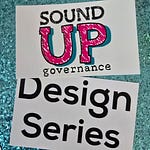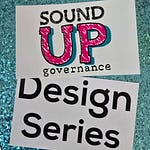Matt Voiceover
00:09
Welcome back to Sound-Up Governance. My name is Matt Fullbrook, and today's the eighth episode from my epic conversation with my friend and trusted governance ally, Andrew Escobar. If you've been listening to this whole season so far, can we just take a second and marvel at how much cool stuff Andrew has to say? And there are still at least three more episodes to go. Today he gives us some advice about how to build confidence as a director that you're being useful to management. After all, management is the consumer of the board's work product. So why wouldn't every director be deeply interested in being useful to them? Let's hear what he has to say.
Matt
00:53
How in your world, your. Your experience as a director, how explicitly do you think about your own work, but also collectively the board's work through the lens of. To what extent is the stuff that I do actually useful to management?
Andrew Escobar
01:10
I think that's a huge amount of my thinking. It really is my evaluation. That's who I actually want to be useful to. And maybe not just like your CEO or the senior leadership team. I think it's a bit more expansive depending on the size of the organization. But I always think about how is this work going to positively or negatively impact the work of the team? How does this cascade throughout the organization? And if it's not going to cascade, that's actually a problem for me. I would want decisions that we're making as a board or my input as individual director to shape a decision that is going to cascade potentially throughout the organization. And that starts with your management or senior leadership team. And so I do think about that a lot.
Matt
02:05
How do you know or to what extent do you try to learn whether it is useful?
Andrew Escobar
02:13
You ask! You can ask, believe it or not, you can just ask if you're being helpful or not helpful, and are you being constructive or not? Because sometimes you're creating work for a team as a board or as a committee. But that might be okay. It's not about making. I've always said it's not about making a CEO or a team's job easier. You might in fact be making their job harder. But it might be useful to you as a board, but. And in your view, useful to the organization as a whole. But it needs to be well received by the management team in some way or another. Right?
Andrew Escobar
02:56
There's a recognition that, yeah, you're asking a lot of questions, or this specific question that's going to be tough for us to get you answers on, or this initiative is Going to be hard for us. But we understand the reasoning behind it. Right? That that decision is clear to us for these reasons, right? It's not about just making decisions. It's about understanding why the decision was made. So it's constantly checking in and making sure that it is being well received or understood. Like, okay, we made a decision. Do you understand that decision? And that seems obvious, right? Well, like, you made a decision. It's, it's clearly minuted. You can walk away from it. It's gonna, it's gonna happen. Maybe not. Sometimes it doesn't. Or sometimes it's not prioritizing the way you thought it would be. Or they're off to the races and prioritizing and you thought, "okay, well, this isn't a... we didn't need this done now, like, let's hold off on this.". And so how do you do the work of a director? How do you aim for good governance if you're not checking in with one, each other on the board, but two, the management team? And how are you going to do that? Because it's maybe not up to me as an individual director to be checking in. Is it the chair, Is it the committee? That is a whole other challenge around good governance.
Matt
04:10
So is that, when you think about this question, the bigger question of like, am I used doing things that are useful to management, or is the board doing things useful to management? Because I agree with you, it's an important question to say, okay, well, who should be asking the question? Who should be interacting with management to figure this out? Let's say that person is not you. Let's say there's, you know, it's clear Andrew's not the guy who's going to have this conversation with management. How do you learn whether you're doing anything that's useful?
Andrew Escobar
04:43
I don't know.
Matt
04:44
Yeah.
Andrew Escobar
04:44
I'm going to tell you, though, maybe it's the opposite. I'm going to actually approach it to the time when I had most clarity around if what I was doing was helpful or not. And that very much was taking it on myself to ask the team, is this helpful? How are we getting in your way? How does that impact you? I want to know what we can be doing different. And I might not agree, but when I did that most clearly every time it was beneficial, I think to me, and I would like to think to the board as a whole. But it wasn't always formal. It wasn't like the reporting structure of the chair will bring this to the CEO in their debrief and then report back.
Andrew Escobar
05:31
Sometimes it's just an informal chat or sitting next to each other at dinner and having that again, that relationship with them where they can be honest with you and you can be honest with them. And that's, you know, thinking back to relationships, I think that is fundamental.
Matt Voiceover
05:50
25ish years ago, at the beginning of my career studying corporate governance, I spent a majority of my time reading granular details in public filings from big Canadian corporations to gather data for a couple of different projects, including one that continues to this day as Board Games in the Globe and Mail newspaper. At the time, there was this conventional thinking that any personal ties among directors and/or executives was worthy of suspicion. Like if we knew that two directors on the same board had worked together before or were members of the same country club, we'd basically think of it as a gotcha moment and assume that they were in cahoots. Andrew's point today, though, is a perfect example of why that thinking is completely wrong. Social ties can lead to trust. Trust can lead to honest conversations, which can lead to valuable feedback, etc. Let's hold onto this message the next time we feel the urge to judge a board through a cynical lens. Next time we take a total left turn and talk about AI. So be sure to subscribe if you want to stay up to date. And if you want to learn more about today's music, check out the notes at the end of the post at groundupgovernance.com. If you enjoyed today's episode, please tell a friend to check out the show. Thanks for listening.
Music Notes
Today’s music was a total experiment. In my files, the track is called “I’m a DJ”. Not because I’m an actual DJ, but…I pulled out some fun DJ tricks to make it happen. It started with the slightly spooky echo guitar part, which I played on my Fender Gold Foil Jazzmaster using some effects on the Headrush MX5. The drums were a combination of “finger drum” style playing (especially the slightly sloppy hi hat sounds") and sequenced (kick and snare), which led to a bit of a sloppy feel at times. Oh well. The bass is just a sawtooth synth. All of the drums and bass were done on the Teenage Engineering OP-Z. The actual DJ part was knitting the track together “live” using the TX-6 and TP-7. All the jittery re-starts, the muting of the bassline, the little record scratch sound, etc. was me just doing DJ tricks. Again, not perfect. But it has a fun energy, right?
PS: Every time I’ve been in a guitar shop with the Gold Foil Jazzmaster, all the guitar nerds act like they’ve seen a celebrity. Not because it’s the best or most sought-after guitar in the world. It’s really just that sexy to look at in person.













Share this post